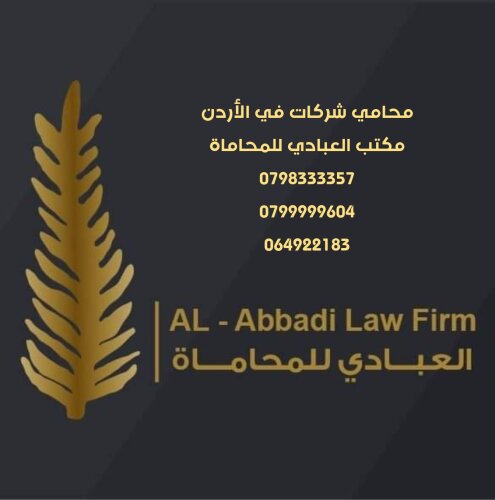Best Native People Lawyers in Hashemite Kingdom of Jordan
Share your needs with us, get contacted by law firms.
Free. Takes 2 min.
Or refine your search by selecting a city:
List of the best lawyers in Hashemite Kingdom of Jordan

About Native People Law in Hashemite Kingdom of Jordan
The Hashemite Kingdom of Jordan, known for its rich historical and cultural heritage, is home to various indigenous communities who have a unique status and presence. Unlike many countries with indigenous populations, Jordan doesn't have a distinct set of laws governing Native People specifically. The country's legal framework is informed by a combination of traditional, tribal, and Islamic influences, which often determine land ownership, resource rights, and cultural preservation for these communities. Native people in Jordan typically refer to the Bedouin tribes and other historically significant groups who have longstanding ties to the region.
Why You May Need a Lawyer
Legal advice is vital in numerous situations involving native communities in Jordan. You might need a lawyer if you are:
- Trying to resolve disputes involving land rights or ownership.
- Faced with issues related to cultural heritage protection.
- Involved in negotiations around resource management and usage.
- Seeking to navigate the complexities of traditional and civil law interfaces.
- Working on advocacy or policy development regarding indigenous rights.
- Experiencing discrimination or marginalization based on native status.
Local Laws Overview
The legal context for Native People in Jordan is influenced by a melding of traditions and modern law. Key aspects include:
- Land Ownership: Traditional tribal systems often govern land ownership and use. These may conflict with formal law.
- Resource Rights: Issues of water and grazing rights are central, especially for Bedouin tribes, requiring negotiation across modern legal and tribal systems.
- Cultural Preservation: Efforts to preserve the cultural heritage of native communities are supported by various policies, though enforcement and support may vary.
- Discrimination Laws: While Jordanian law broadly prohibits discrimination, native peoples sometimes face unique challenges not fully addressed by existing laws.
Frequently Asked Questions
What defines a Native Person in Jordan?
In Jordan, "Native People" primarily refers to communities with deep historical roots in the region, including Bedouin tribes.
Do Native People have different legal rights in Jordan?
They operate under the same legal framework as all Jordanian citizens but have additional traditional systems influencing their rights, especially regarding land and resources.
How are land disputes typically resolved?
Land disputes may be settled through tribal negotiations or within the civil court system, depending on the context and parties involved.
What role do tribal laws play in modern Jordan?
Tribal laws remain influential, particularly in rural areas, and often play a significant role in matters of personal status and land rights.
Are there special protections for Native People’s cultural heritage?
Yes, there are efforts to protect cultural heritage, though the extent and effectiveness of such protections can vary.
What legal challenges do Native People face in Jordan?
Challenges include navigating between tribal and civil legal systems, land and resource rights issues, and lesser protections against cultural erosion.
Can Native People own land outright?
Land ownership is complex and can be governed by tribal customs or modern legal frameworks, making outright ownership challenging to define.
What is the role of international law regarding Native People in Jordan?
Though Jordan has engaged with international treaties, the direct impact of international law on native rights is limited but evolving.
How can Native People advocate for their rights?
Advocacy can occur through forming community coalitions, working with NGOs, or engaging in the formal political process.
Do Native People have political representation in Jordan?
While there is no specific representation quota, native communities often participate in local and national governance through various means.
Additional Resources
For more support and information, consider reaching out to:
- Jordanian Ministry of Culture - Works on cultural heritage preservation.
- Local tribal leaders - Can provide guidance on tribal law matters.
- NGOs focused on indigenous rights - Offer advocacy and support in legal matters.
- The United Nations Human Rights Council - For international perspectives and support.
Next Steps
If you require legal assistance regarding Native People issues in Jordan, consider the following steps:
- Consult local tribal leaders or a representative familiar with both modern and tribal laws.
- Seek advice from a lawyer specializing in land rights and cultural heritage.
- Contact NGOs or organizations dedicated to indigenous issues for additional support.
- Document any legal issues or disputes thoroughly, including all communications and agreements.
- Stay informed about any legal reforms or policy changes impacting native communities.
Lawzana helps you find the best lawyers and law firms in Hashemite Kingdom of Jordan through a curated and pre-screened list of qualified legal professionals. Our platform offers rankings and detailed profiles of attorneys and law firms, allowing you to compare based on practice areas, including Native People, experience, and client feedback.
Each profile includes a description of the firm's areas of practice, client reviews, team members and partners, year of establishment, spoken languages, office locations, contact information, social media presence, and any published articles or resources. Most firms on our platform speak English and are experienced in both local and international legal matters.
Get a quote from top-rated law firms in Hashemite Kingdom of Jordan — quickly, securely, and without unnecessary hassle.
Disclaimer:
The information provided on this page is for general informational purposes only and does not constitute legal advice. While we strive to ensure the accuracy and relevance of the content, legal information may change over time, and interpretations of the law can vary. You should always consult with a qualified legal professional for advice specific to your situation.
We disclaim all liability for actions taken or not taken based on the content of this page. If you believe any information is incorrect or outdated, please contact us, and we will review and update it where appropriate.
Browse native people law firms by city in Hashemite Kingdom of Jordan
Refine your search by selecting a city.














